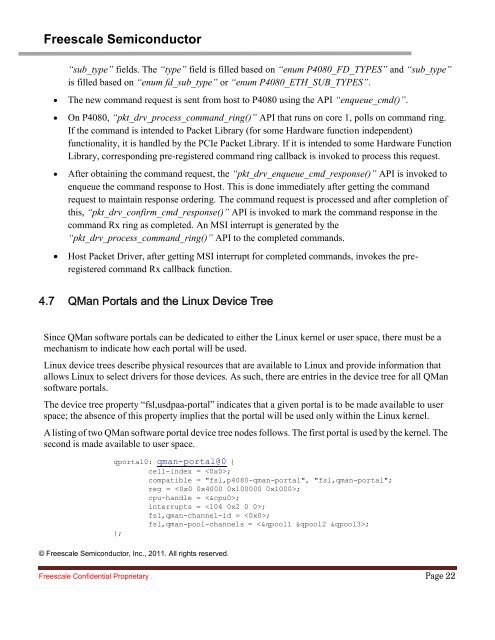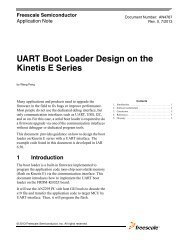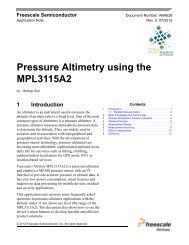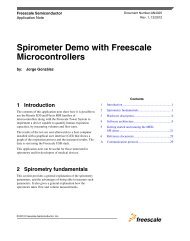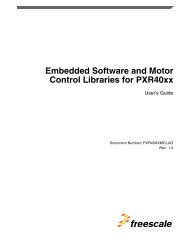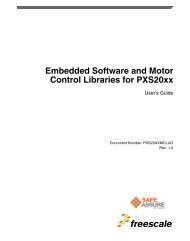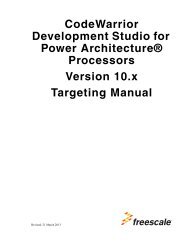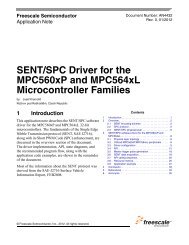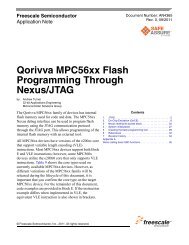P4080 PCIe Adapter SDK User Guide Production Release
P4080 PCIe Adapter SDK User Guide Production Release
P4080 PCIe Adapter SDK User Guide Production Release
You also want an ePaper? Increase the reach of your titles
YUMPU automatically turns print PDFs into web optimized ePapers that Google loves.
Freescale Semiconductor<br />
“sub_type” fields. The “type” field is filled based on “enum <strong>P4080</strong>_FD_TYPES” and “sub_type”<br />
is filled based on “enum fd_sub_type” or “enum <strong>P4080</strong>_ETH_SUB_TYPES”.<br />
The new command request is sent from host to <strong>P4080</strong> using the API “enqueue_cmd()”.<br />
On <strong>P4080</strong>, “pkt_drv_process_command_ring()” API that runs on core 1, polls on command ring.<br />
If the command is intended to Packet Library (for some Hardware function independent)<br />
functionality, it is handled by the <strong>PCIe</strong> Packet Library. If it is intended to some Hardware Function<br />
Library, corresponding pre-registered command ring callback is invoked to process this request.<br />
After obtaining the command request, the “pkt_drv_enqueue_cmd_response()” API is invoked to<br />
enqueue the command response to Host. This is done immediately after getting the command<br />
request to maintain response ordering. The command request is processed and after completion of<br />
this, “pkt_drv_confirm_cmd_response()” API is invoked to mark the command response in the<br />
command Rx ring as completed. An MSI interrupt is generated by the<br />
“pkt_drv_process_command_ring()” API to the completed commands.<br />
Host Packet Driver, after getting MSI interrupt for completed commands, invokes the preregistered<br />
command Rx callback function.<br />
4.7 QMan Portals and the Linux Device Tree<br />
Since QMan software portals can be dedicated to either the Linux kernel or user space, there must be a<br />
mechanism to indicate how each portal will be used.<br />
Linux device trees describe physical resources that are available to Linux and provide information that<br />
allows Linux to select drivers for those devices. As such, there are entries in the device tree for all QMan<br />
software portals.<br />
The device tree property “fsl,usdpaa-portal” indicates that a given portal is to be made available to user<br />
space; the absence of this property implies that the portal will be used only within the Linux kernel.<br />
A listing of two QMan software portal device tree nodes follows. The first portal is used by the kernel. The<br />
second is made available to user space.<br />
qportal0: qman-portal@0 {<br />
cell-index = ;<br />
compatible = "fsl,p4080-qman-portal", "fsl,qman-portal";<br />
reg = ;<br />
cpu-handle = ;<br />
interrupts = ;<br />
fsl,qman-channel-id = ;<br />
fsl,qman-pool-channels = ;<br />
};<br />
© Freescale Semiconductor, Inc., 2011. All rights reserved.<br />
Freescale Confidential Proprietary Page 22


